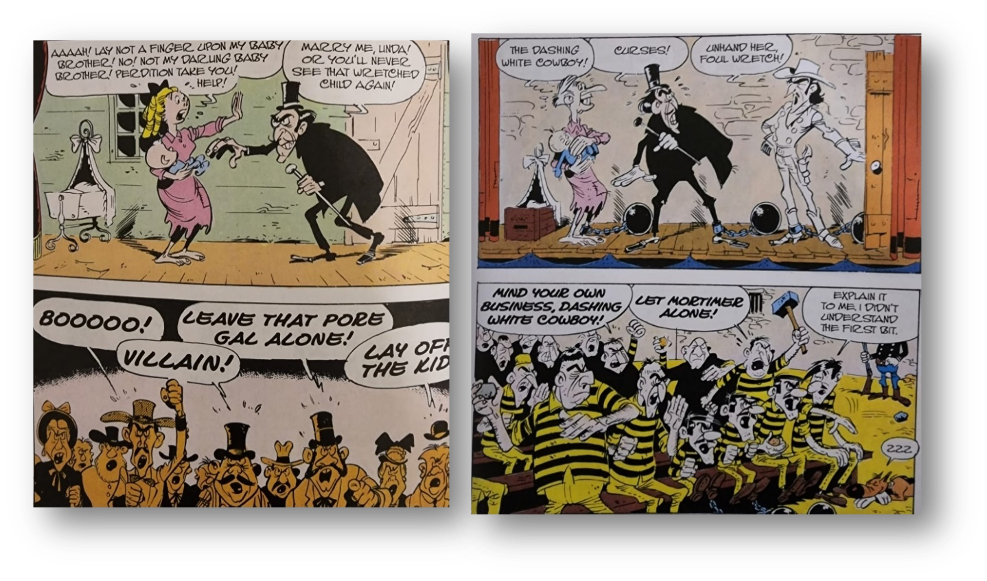The posts for this week come from the Digital Data & Technology AEA Conference Working Group, and share how digital data and technology are factoring into reshaping evaluation.
Hi, I’m Valentine J Gandhi, I work on Evaluation, Innovation and Tech4Good.
In his article Digital Development, what’s in a name?, my friend and colleague Richard Heeks, from the University of Manchester, traces the evolution of the use of digital technology within the international sector. Evolving from Information and Communications Technologies for Development (ICT4D) to ‘doing development in a digital world.’ Evaluators have a great role to play in this digital era to ensure the benefits are inclusive and the social barriers existing in society are broken. Carol Weiss argued that evaluation tends to produce learning within the frames of the status quo.
As a child, I loved the funny comic strip Lucky Luke. A funny take on cowboys of the west, the protagonist ‘Lucky’ Luke is a social justice warrior ‘who can shoot faster than his own shadow.’ In one of his comics, there is a storyline of a traveling theatre group, who perform in towns, but robs them. This theatre group’s play is often about a damsel in distress who needs rescuing from a villain by a ‘dashing white cowboy.’ When it’s performed to an audience of regular town folk, everyone cheers for the cowboy. But when they are eventually captured and thrown in the prison and they enact the same show within the prison, the prisoners, throw tomatoes on the cowboy and cheer on the villain.

In many ways, what we cheer for in society is deeply rooted in who we are. As evaluators, we need to self-reflect and see what we are cheering on. Is it the establishment orientation and status quo, or are we truly reflecting the social barriers that exist in society that may be amplified with the onset of digitalization. If we find ourselves cheering on factors that contribute to divisions, polarity and continued discrimination, then we need to recuse ourselves from being an evaluator or bring in a self-transformation.

Technology is pushed by technology companies, and is understandable. But if we see Tech4good jobs in the UN, or government and other NGOs, these are held mostly by technology experts. This needs to change. There is a need for a blended skill set of those who understand technology, and those who understand the ground realities and the contexts in which they are implemented. Additionally, ‘technology designs’ rarely focus on abuses and issues of oppression. Technology is only a tool. As Melvin Kranzberg quoted in 1985, “Technology is neither good nor bad; nor is it neutral.” It does not create social biases, rather arrives in an already biased or unequal society; but can amplify these if the existing social barriers are not considered in designing a technology.
Therefore, as evaluators, we need to:
- Move beyond ‘establishment orientation’ and status quo-based evaluation towards a social Justice lens-oriented evaluation that considers complex dimensions.
- Develop skill sets towards understanding technology basics and grounding in transformative evaluation methods
- Self-introspect, on who are we cheering on? Whose agenda are we carrying forward and are we are bringing about social change.
In an earlier AEA Blog, I argued the need for evaluators to look beyond factors of equity and equality and use a lens of oppression and institutionalized discrimination. Evaluation with a Social Justice lens is not new, recognizing that evaluations are never objective, neutral or value-free, the International Organization for Cooperation in Evaluation, holds the position that the central value for evaluations and evaluators should be equity and social justice. This can be achieved with practice and self-discipline.

The American Evaluation Association is hosting Digital Data & Technology Week with our colleagues in AEA’s Digital Data & Technology Working Group. The contributions all this week to AEA365 come from working group members. Do you have questions, concerns, kudos, or content to extend this AEA365 contribution? Please add them in the comments section for this post on the AEA365 webpage so that we may enrich our community of practice. Would you like to submit an AEA365 Tip? Please send a note of interest to AEA365@eval.org. AEA365 is sponsored by the American Evaluation Association and provides a Tip-a-Day by and for evaluators. The views and opinions expressed on the AEA365 blog are solely those of the original authors and other contributors. These views and opinions do not necessarily represent those of the American Evaluation Association, and/or any/all contributors to this site.

Your post on AEA’s Digital Data & Technology Working Group Week was a fascinating read, particularly the insights you shared from “Lucky” Luke’s presentation on evaluation in a digital world. I appreciated the way you outlined the challenges and opportunities of conducting evaluations in the digital age, and how “Lucky” Luke’s approach to leveraging technology and data can help address these challenges.
It was interesting to learn about the use of digital tools and platforms for data collection and analysis, as well as the importance of adopting a collaborative and iterative approach to evaluation. I also appreciated the emphasis on ethical considerations, such as privacy and confidentiality, when using digital technologies in evaluation.
One of the key takeaways from your post was the importance of balancing the benefits and limitations of technology in evaluation. While technology can certainly improve efficiency and accuracy, it’s crucial to be mindful of its potential biases and limitations, and to use it in conjunction with other methods and approaches.
Overall, I found your post to be a valuable contribution to the conversation on digital data and technology in evaluation. The insights and strategies you shared are relevant not just for evaluation professionals, but for anyone interested in leveraging technology to improve their data-driven decision-making processes.